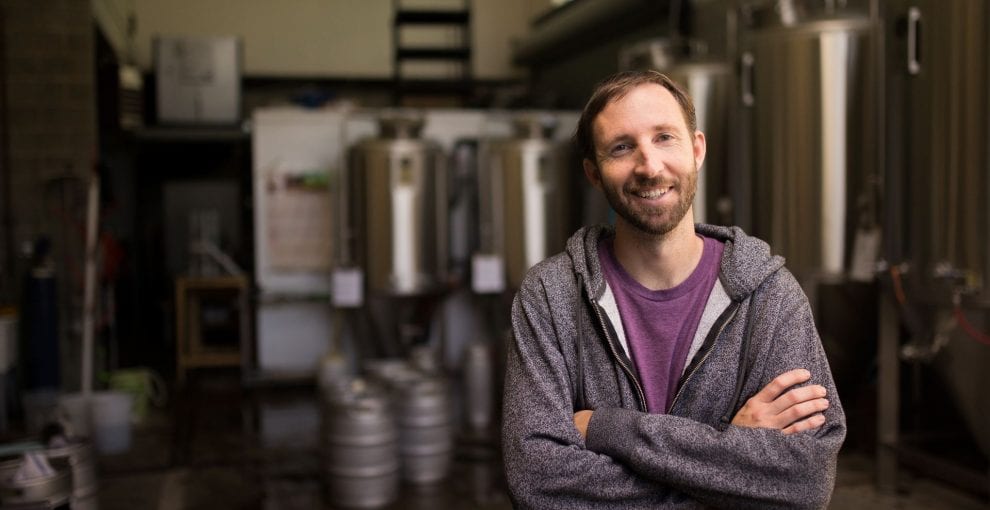[Meet the Instructors is a series intended to introduce you to one of the greatest resources the University of Washington Tacoma Professional Development Center has to offer: its diverse team of veteran, industry-tested professionals. The Center’s professional development programs are designed to be rewarding, challenging and cutting-edge. Our instructors play no small part in that, ensuring students are exposed to the most current industry trends while remaining well-versed in the tried-and-true best practices of their professions. We’re excited to share our instructors with you, and their stories are a great place to start.]
This January, a group of students will attend the Professional Development Center’s newest craft beer industry course: Fundamentals of Commercial Brewing. Building off the success of Mastering Beer Styles and Business of Craft Beer, this course will introduce students to the technical, operational world of commercial brewing. Like the craft beer courses before it, this course will be taught by industry experts with real-world lessons informing the curriculum. Leading the helm is Lowercase Brewing’s owner and managing member, Christopher Smith.
Smith’s day-to-day responsibilities at Lowercase keep him plenty busy – he led the brewery from a concept five years ago to a 10-person, $500,000 operation – but he’s excited to tickle another passion with this course: teaching. Smith has a master’s degree in education, which he previously applied in his 10 years of working for Starbucks as an instructional designer and training specialist.
“My whole family is teachers, so this is a neat opportunity,” said Smith. “I think it’s cool because in the industry we’re always looking for great people.”
“If I can help people be more successful in the industry and more prepared when they enter, I think that’s a win for everybody. As they say, a rising tide floats all boats,” he said.
It’s not Smith’s passion alone, but his ability to combine it with his industry experience, that will set the curriculum of the course apart. Smith has been brewing beer for about a decade. He started as a home brewer, and building from a culinary background, quickly progressed to making his own recipes. As a brewer, he takes inspiration from famous chef Thomas Keller.
“One of his things is he likes to let the individual ingredient shine; a less is more philosophy,” said Smith. “That’s how I approach beer: all of our recipes are super simple. We try to use really good ingredients and we use the least number possible for that particular recipe. So for an IPA, instead of seven hops, we’ll use two hops to let the individual hop profile shine in that beer.”
Despite identifying with the philosophies of a famous chef though, Smith maintains that he enjoys craft beer’s cultural significance as “a drink of the people.”
Simplicity and approachability – those are the tenets of Lowercase, he said. In fact, this philosophy is born out in the brewery’s name:
“If you think about lowercase letters, they’re really just content carriers. They’re not bold, they’re not slanty, they’re not trying to get your attention – they’re just there to deliver a message,” said Smith. “For us – that’s the beer. It should always be about the beer first. We’re a brewery – we should make excellent beer or we should not do it at all. It doesn’t matter about our packaging or our font or our logo or all these ancillary pieces. It should be about the core – the content – and that’s what the name symbolizes.”
Despite a highly saturated beer market, the beer industry is still in an exciting place, said Smith. According to a 2016 study from the National Beer Wholesalers Association, the economic impact of the beer industry in Washington was nearly $9 billion in 2015.
“There is always room for better and interesting,” said Smith.
But becoming better and more interesting can be difficult, which is the space into which this course enters. As competition in the state grows, the ability of both industry businesses and workers to differentiate themselves from the crowd is more important than ever.
Completing a certificate like Fundamentals of Commercial Brewing allows beer pros to build on industry knowledge, avoiding costly mistakes and wasteful missteps, while simultaneously communicating their value to future employers.
Smith said the curriculum is geared toward anyone who wants, or needs, to better understand the complex system that is a commercial brewery. Front of house staff that want to move to the back, brewers who want to move into management and operations, home brewers looking to work for a commercial brewery, entrepreneurs looking to enter the industry – all are examples of professionals who would benefit from this certificate.
“Not everyone wants to be a brewer,” said Smith. “There are a lot of positions that don’t directly make beer, but support the process. What differentiates this program is we’re not just teaching how to make beer – we’ll be able to talk about the technology, the process, and the facility that makes beer happen.”
“If you want to go into brewing, we’re going to help you do that better. If you don’t want to go into brewing, it’s going to help you understand it as a system and better perform support roles for the brewery.”
“To me, the course is trying to get people to look at the brewery as a factory,” said Smith. “A factory needs a bunch of pieces. I look at it like a big gearbox. The brewery is the center gear, but the center gear is driven by a bunch of ancillary pieces. If one of those pieces stops rolling, the brewery stops rolling.”
These are the types of lessons Smith wishes he had learned before building up Lowercase. One memory stands out, he said.
“I bought a $13,500 glycol chiller – and at the time didn’t understand I needed $2,000 of electrical work, $3,000 of plumbing and $1,000 of structural and all these extra things. My $15,000 glycol budget quickly became a $20,000 glycol budget,” he said.
“Being successful at navigating this world really comes down to your ability to talk to different people. When you’re talking to an electrician, you need to understand the terminology, you need to be able to slightly speak electrician. When you’re talking to a plumber you need to be able to slightly speak plumber.”
Like Smith said, commercial brewing technology involves complex systems, and a successful brewery successfully makes those systems work in harmony. Students in this program will learn the skills necessary do just that – including speaking electrician, plumber and more. Major course objectives include participants being able to:
- Outline the major steps included in a typical brewing process
- Identify and articulate the major pieces of equipment used in a typical brewery
- Read and effectively analyze a quote from a brewery equipment manufacturer
- Identify the cause of possible production pinch-points and associated potential solutions
Fundamentals of Commercial Brewing starts Jan. 22 and will meet at UW Tacoma and several regional breweries. To learn more and register, visit the program webpage.
Want to meet more instructors in our craft beer program? Click here to view more of the Meet the Instructors series.

